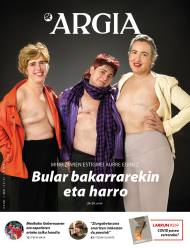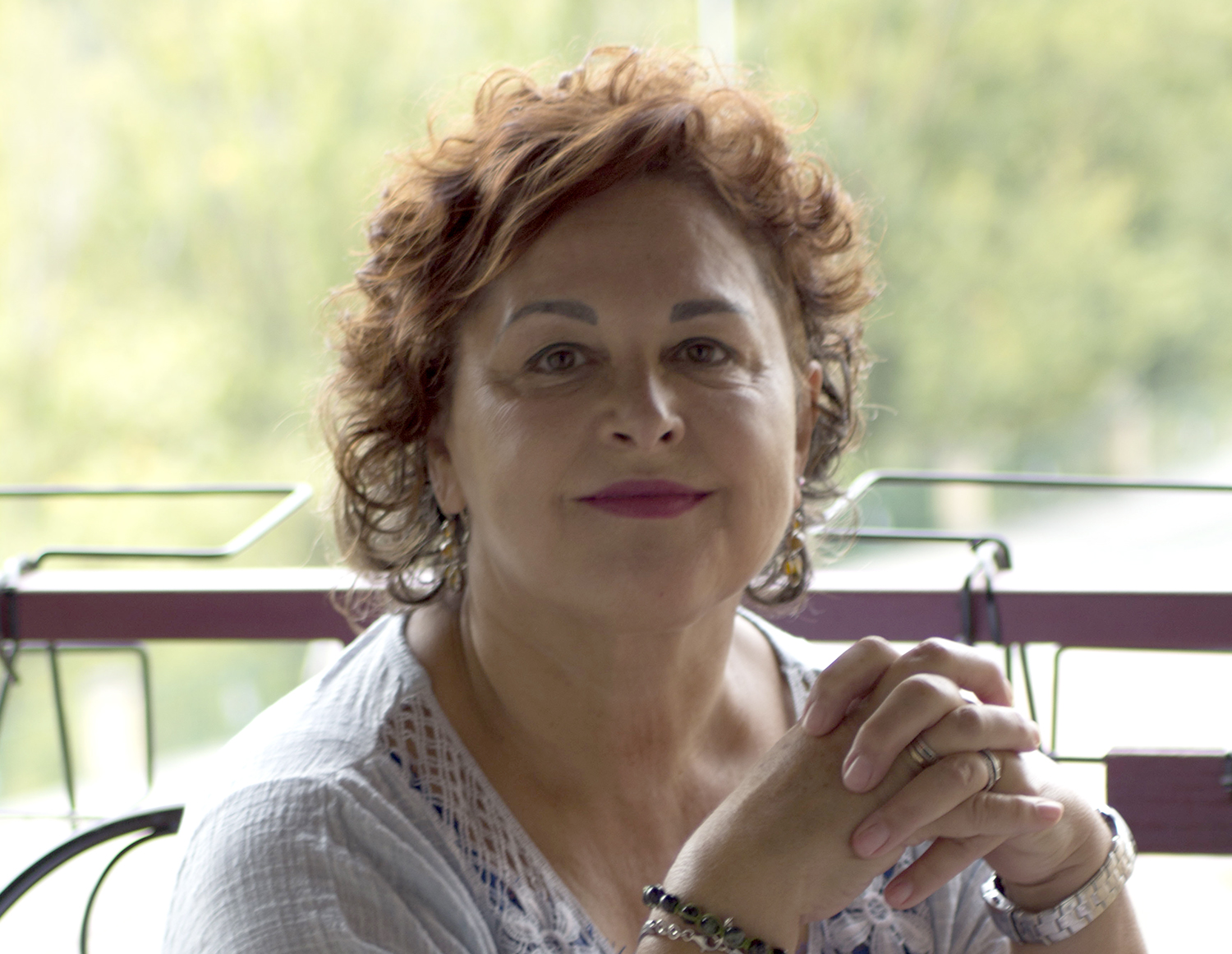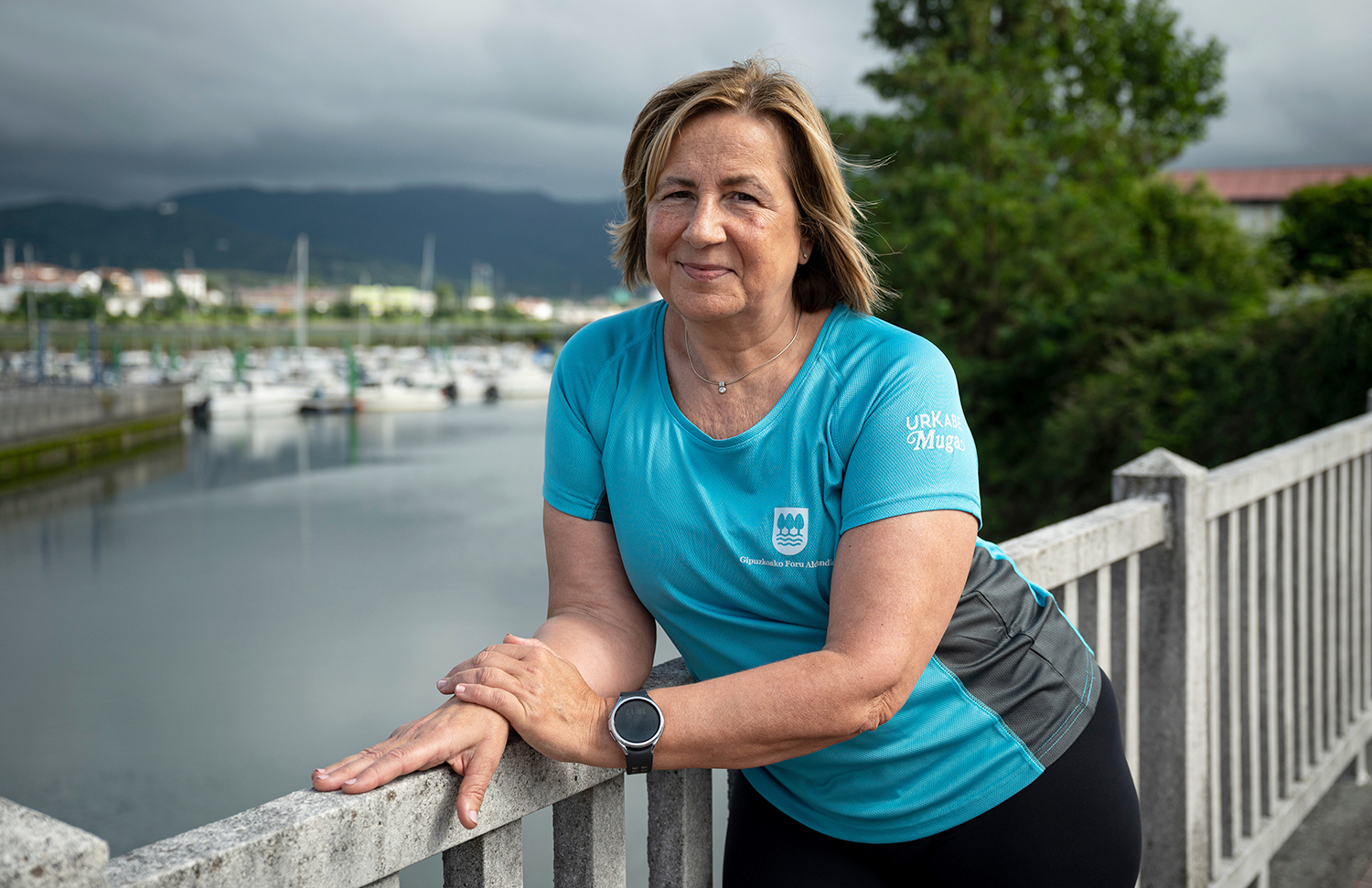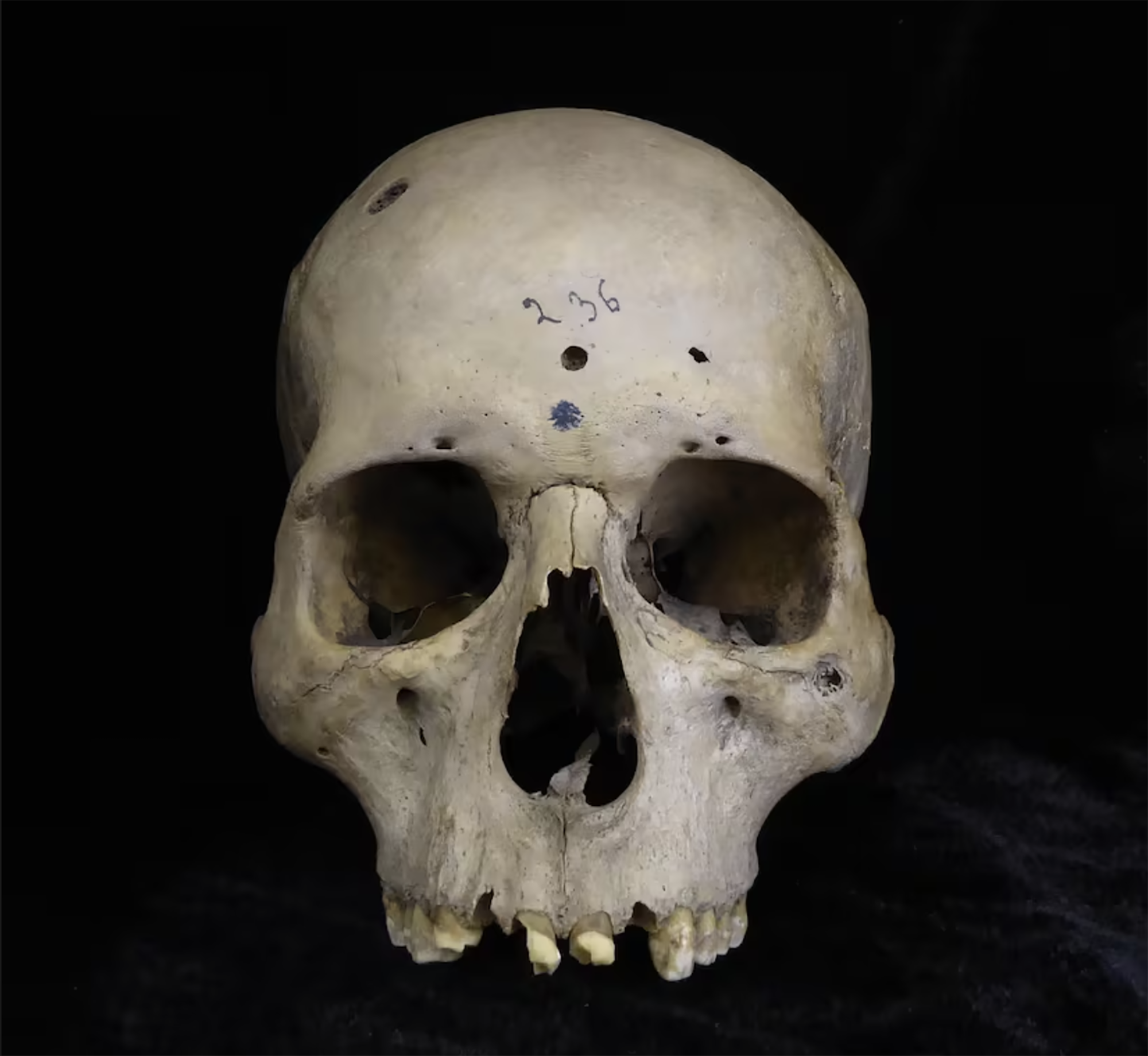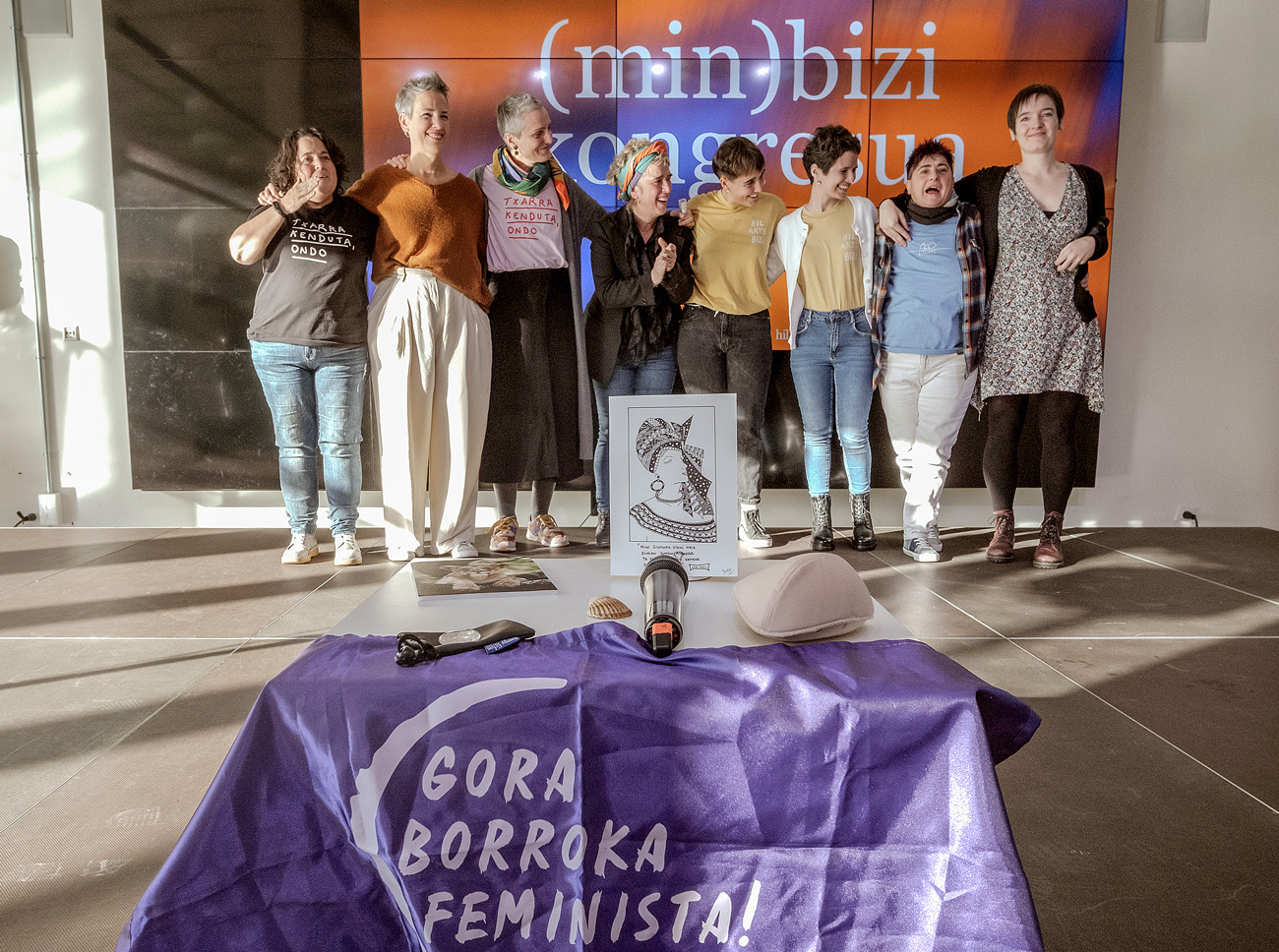Bring out what they want to hide
- “I believe that the socially accepted prosthesis is just one more way of silencing and differentiating women with breast cancer.” This was collected by African-American writer Audre Lorde in 1980 in his book The Cancer Journals. Lesbian, the same feminist and activist, was banished by breast cancer and published her book from her own experiences. Four decades later, Sandra Barkaiztegi Navarro, Olatz Mercader and Elena Guinea met with us to make the same claim: the system has “hidden and silenced” single-parent women and have met to fight it.
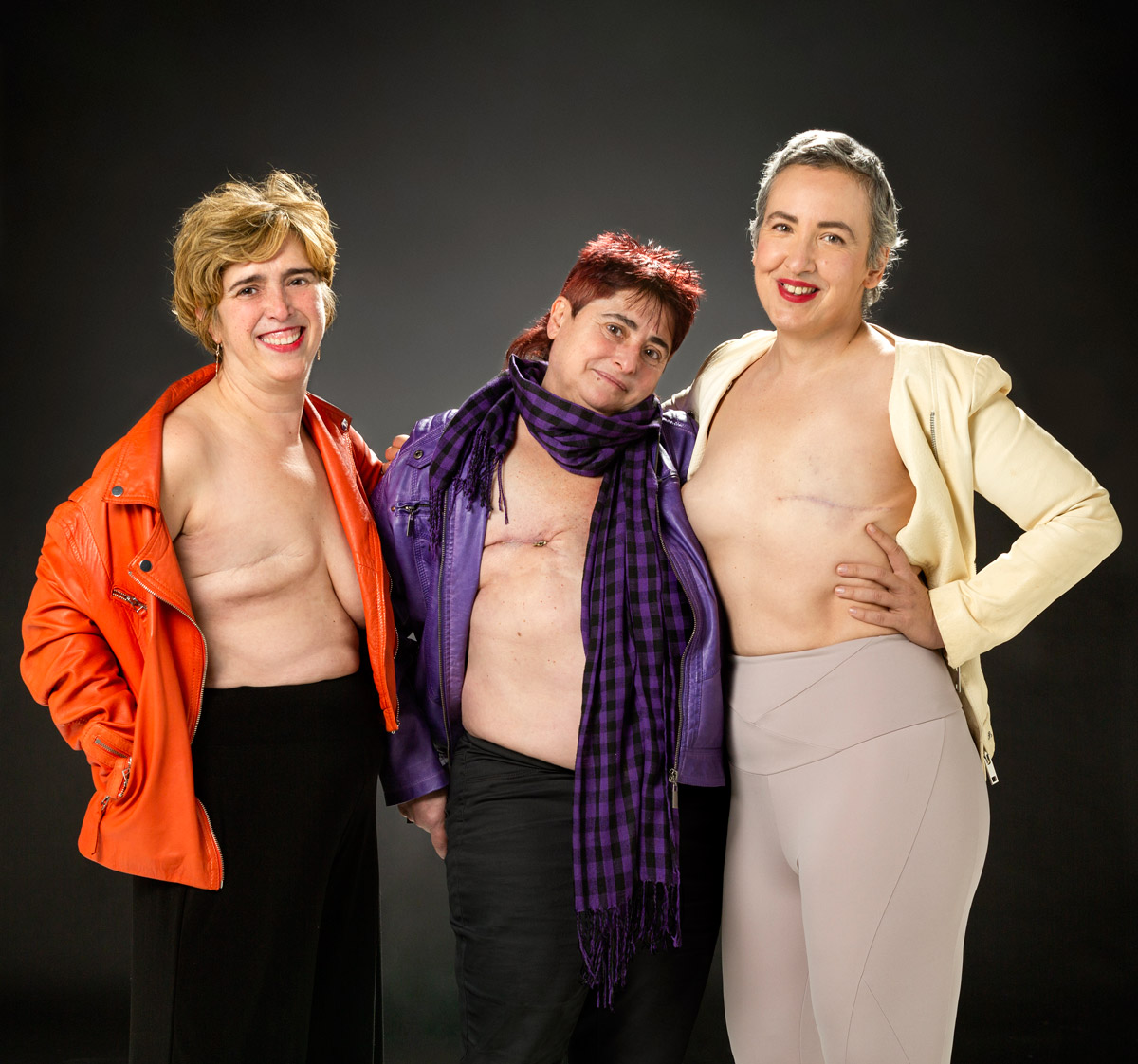
From the voices of their bodies and their experience, they have discovered the needs of people with breast cancer and have denounced the deficiencies of the health system. "Just as reality is hidden, our needs are also hidden." Among other things, they stress that after mastectomy the oncologist should offer all the options "at the same level", without directly referring to breast reconstruction or prosthesis placement. That is, to normalize the option of staying. "There are no universal formulas. The system should empower each person to decide for themselves what is the most convenient option for them," says Olatz.
It is noted that they have drunk from the ideas of the Lord, who from the very beginning have chosen to share the cancer process from care and fraternity. All three have experienced the disease differently, but they have some common keys. The Izan Inurri association has found the possibility of sharing reflections on the pain and life that have emerged from cancer, together with some women who are going through the same process: "In Inurri, unpainted pink, we live cancer naturally from feminism, love and tenderness." As in these pages, they appear with a single breast and a strong boost, in the calendar of 2022 that the association has put on sale. Sandra clarifies the objective: "I'm not naked to make my body visible, but to make it not invisible." Inurri was founded by Julene Illarramendi and later joined Miren Cuerdo and Irati Jauregi, who have launched several tobacco prevention projects. Departing from Lasarte-Oria, the "anteaters" intend to extend them to the whole of the Basque Country.
Double stigma
Any cancer is in fact a hard process, both for the one that gives body to the disease and for those who help you on your way. "It captures all the dimensions of the person." In addition, it is full of stigmas and generates fear; society lives "behind the backs of cancer" to avoid it. They recognize that the theme causes discomfort, but the most uncomfortable questions are the ones that are not asked. In addition, these women have an added "overload", as they have had a chest removed to fight breast cancer. Double stigma.
Elena Guinea: "We cannot live under external judgments, we are like this and we only have to take it naturally"
However, the existence of a single breast has gradually become naturalized. Sandra asks correctly: "At some point I thought I was going to lose my life, so what is losing my chest? ". All three agree, the most important thing is to live. However, breast loss also affects women. On the one hand, because they have taken away an intimate part that is valuable to their own body, such as that related to pleasure, femininity and good feelings for many. On the other hand, because the current patriarchal system does not consider solitary breasts normal, since having two breasts to be "whole woman" is an indispensable condition for the eyes of society.
Elena, fed up with mastectomy, tells the situation she found after mastectomy, both in the health system and in clothing stores and in everyday life: "I was shocked, it's an absolutely secret and hidden reality." Remember the case of Aintzane Artola. Five or six years ago, she had a chest removed due to cancer, and even though she felt very uncomfortable with the silicon prosthesis, they made her believe that the problem was the same. "The oncologist told him that there was no one to think like him, he felt a great loneliness." He had the "courage" to go out in the street without prosthetics and was one of the first to open up breast loneliness in the media. Olatz thanks him that, listening to his testimony on television and that of Izan Inurri, he discovered the possibility of continuing to live with one breast: "Fortunately, we're getting more and more." That is what they want, that women who are in the same situation do not feel alone and are willing to be referents.
.jpg)
Cancer has also become a business
Why are they invisible to the system? Among other causes, capitalism is accused of guilt. "Loving how it is is a radical revolutionary act," Olatz said. According to Elena, behind the aesthetic stereotypes there is a tremendous business. That's why they're silenced: they don't generate revenue because they don't need wigs, prosthetics or other special clothing to be comfortable with. However, despite wanting to buy them, they have difficulty finding clothes that fit their only bodies, such as swimsuits and chest. There's hardly any, "and the ones there are are very expensive." In addition, almost all patients have a cuff to insert the prosthesis.
The three or three have clarified that they are "privileged" because they have had the opportunity to get the resources to pass the cancer they have needed and wanted. But this is not the case for all women. They stress the need to provide more institutional support to people in most vulnerable situations. The cases of two known women in the treatment are mentioned. Of Latin American origin, one was evicted in full chemotherapy and forced to share a room with two other people. At birth, the Moroccan, the other; amidst the treatment, his only concern was to calm back pain in order to help his daughter in the bar.
The public health network is not available
The Donostia Hospital and the Oncologic Hospital have had to spend many hours, so they have known the "deficiencies" of Osakidetza closely. They emphasize that all professionals are wonderful, but that resources are lacking. Sandra says that the components have to put them out of their will because the institutions do not give them enough tools. "Less pink tie and more measures," Olatz complains.
Olatz Mercader: "The system should empower each person to decide for themselves what is the most convenient option."
"When you go into the healthcare system, everything works really well: upscale machinery, doctor appointments, tests... but the feeling is that you're on a conveyor belt." They have missed human aid to clarify doubts or ask for advice. For example, Olatz asked the oncologist who should be heading for nutrition and exercise help, and he responded that they don't get there. On the contrary, on other issues they do: they are given a list of hairdressers selling wigs and prosthetic salesmen. They are aware that the deficiencies are not of oncologists but systemic, "they have little time in consultations of five minutes".
In this sense, they have joined the struggle of the workers of the Oncologic of San Sebastian. In December 2018, the Basque Government signed an agreement to make Onkologikoa a centre of the public network in three years, owned by the Kutxa Foundation. It has been part of Osakidetza since 2019, but workers have been halfway, with lower wages and poorer working conditions; they have been denouncing the situation for months. Elena warns that oncology is losing its "family and special character" historically due to the "economic interests" of the institutions. The Government ' s attitude is the most worrying: "It is inexcusable that the work of their professionals is being underestimated. There is money for whatever you want, for the TAV, for the San Sebastian metro, for the island project... It is unacceptable, people’s lives are at stake! he claimed.
Health before aesthetics
They claim the need for many changes in the health system to treat people "from health and care". For example, they believe that when advising on breast reconstruction, doctors give priority to health aesthetics.
Sandra believes that breast reconstruction is a "very hard process", "terrible", and Olatz adds: "Let's not think that whoever chooses to rebuild is picking the easiest path." He explains that it is an operation of about six hours duration, which includes the ingestion of a piece of muscle by the back and, sometimes, a piece of skin from the groin to form the nipple. "They explain the risks to you, but it's very subtly accepted that you're going to do it." Olatz thought it was "surreal" to propose an intervention of this type in full cancer: "This isn't true of other cancers."
.jpg)
"You're not directly advised about reconstruction, but it's systemic." Sandra was clear from the beginning that she didn't want that, but the surgeons left her a piece of skin "just in case" after doing the mastectomy, so that in the future she could change her mind and do it again. "They have not respected my decision," he regrets. For example, Sandra does not like how the scar has remained, "just in case" for the skin that has left her, and criticizes that the intervention to eliminate it does not enter the social security process, but rather the breast reconstruction. They denounce, therefore, that "freedom of choice" is theoretical.
For Elena, the explanations for the reconstruction are new, since the doctors were not given the opportunity. He was clear that he was not going to do it, and the gynecologist at the Oncologic understood it from the very beginning with all respect. However, the day before mastectomy he called the doctor: "I reminded him, please, I didn't want to remake or leave skin."
Prostheses are not functional.
The prosthesis is also free in oncology, but these women do not use it because, besides being "very uncomfortable", "it is not functional", as are other bodily prostheses. In the life of the waves, for example, the chest has been very important and functional, related to breastfeeding and pleasure, but cannot recover it. "If the prosthesis won't give me that, I'd rather love my body as it is now and value what I've enjoyed the breast. I used it once and it's time to say goodbye to be able to continue living." He puts his butt of chicken in his memory.
All three unanimously recognize that at first it is violent to see the scar instead of the chest. However, normalization has been normalized through daily work. Elena stresses that they cannot live under external judgments: "We are like that and we're ready, we have to take it naturally." The daughters of the waves have seen it from the very beginning, with the innocence that corresponds to the children, and they tell their mother that she has "pirate breast" and that the scar is "xalada." "Children don't have the stereotypes that we have about femininity." He says that that view of the daughters was a "terrible lesson."
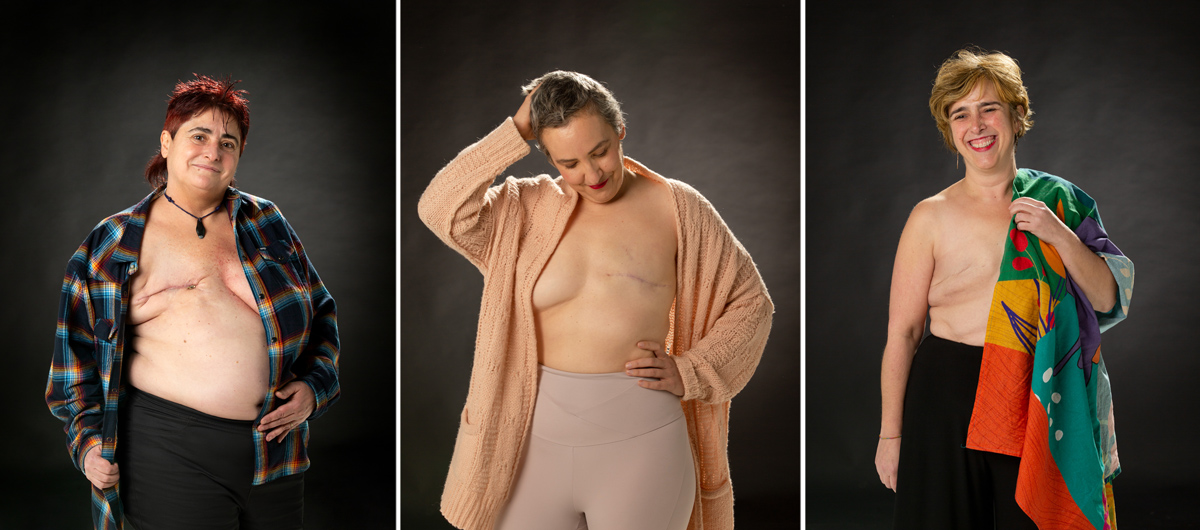
Sandra Barkaiztegi Navarro: "I'm not naked to make my body visible, but to make it not invisible."
Sandra remembers that throughout her life women are in conflict with the shame of their bodies, with or without breasts. The three come from the feminist environment, but they have recognized that the physical and psychological changes derived from cancer have led to litigation related to aesthetics and gender roles. From feminism they answer: "Before we were wrestlers, now more." It has weakened the processes of cancer "from the couch to the impossibility of getting up", but it has also taken over at the same time: "Now we fight from freedom."
Olatz has claimed that happiness cannot be conditioned by a certain stereotype. "Today is today and tomorrow we are not here. The one who received the chemotherapy next to you isn't the next week, and maybe it's you." They claim that they have been changed in the way they look at life, that they have been revolutionized in the order of responsibilities and priorities. Audre Lord left the following thought: "What else can scare us if we've faced death after embracing it? Once the existence of death is assumed as a process of life, who can have power over me again? ".
Importance of early detection
All three have passed breast cancer with the coronavirus pandemic, at a time when public health has been more limited than ever. In fact, Osakidetza has estimated that in CAPV 1,900 tumors have not been detected in 2020 by the "COVID-19 pandemic", of which 202 are breast. Only half of the women who required a mammogram per protocol received a call to go to the test. Therefore, in view of the data, Sandra, Olatz and Elena have been "lucky", as they have detected the cancer in time.
Sandra has just turned 49 and was diagnosed two years ago, going to the doctor after a sting of pain without ever feeling in the breast. He was informed from the outset that he was going to have his chest removed and also received chemotherapy, which was discharged in October. Olatz, 45, has been diagnosed with cancer for a year in December, and the mother of two daughters, who realized that she had a small lump that she was lactating, was captured at an early stage. The process has been going on with two initial interventions and radiotherapy, but insufficient, which in the third intervention have removed the chest. Finally, chemotherapy treatment ended in August.
Elena realized in July that she had a small lump at the age of 54: "I didn't notice it very well, but I knew my body wasn't like that." It has had more obstacle and more time to receive the diagnosis, as it has been in the fifth wave of the coronavirus, neglected beforehand and with the components occupied. In the end, in August, she was told that she had cancer in both breasts. After surgery to clean the tumors, radiotherapy was administered, but later a chest had to be removed, which has been spent four times in two months in the operating room. He is currently taking radiation therapy and will end soon. He insists that if it gets complicated, the other chest is removed, "it's not easy, however," he adds.
When they noticed something strange in the body, they inevitably thought of death. So they were reassured when the oncologist gave her first name and last name: breast cancer, not metastasis. Olatz had a bad time until he knew the results. Meanwhile, Sandra and Elena decided to wait peacefully, Elena waited for the call because she was sure she had something and wanted to be followed up as soon as possible. During the process they have learned that life and death are not contradictory, but that both complement each other, at the same time as joy and sadness and health and illness. Pain and pleasure occupy a place in the same body.
.jpg)
Two years ago, the Catalan archaeologist Edgard Camarós, two human skulls and Cancer? He found a motif card inside a cardboard box at Cambridge University. Skulls were coming from Giga, from Egypt, and he recently published in the journal Frontiers in Medicine, his team has... [+]









